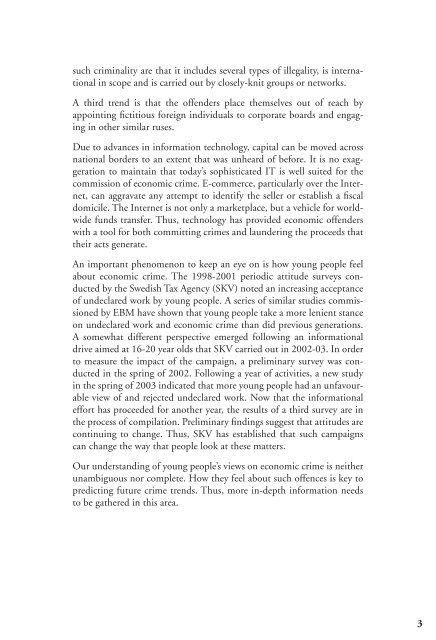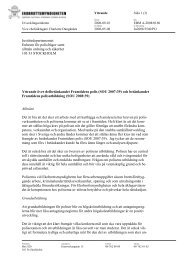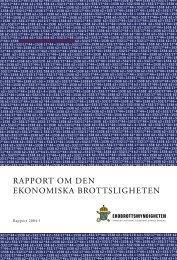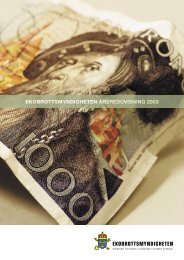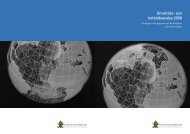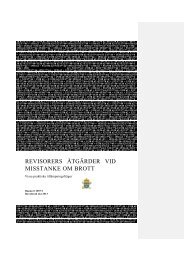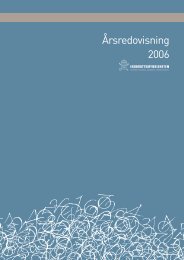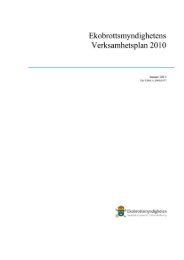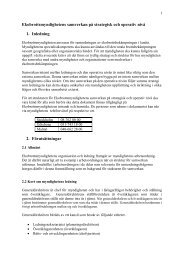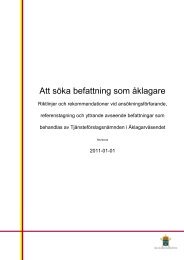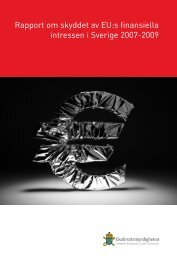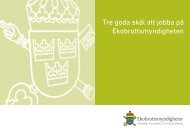Economic crime report 2004 - Ekobrottsmyndigheten
Economic crime report 2004 - Ekobrottsmyndigheten
Economic crime report 2004 - Ekobrottsmyndigheten
You also want an ePaper? Increase the reach of your titles
YUMPU automatically turns print PDFs into web optimized ePapers that Google loves.
such criminality are that it includes several types of illegality, is international<br />
in scope and is carried out by closely-knit groups or networks.<br />
A third trend is that the offenders place themselves out of reach by<br />
appointing fictitious foreign individuals to corporate boards and engaging<br />
in other similar ruses.<br />
Due to advances in information technology, capital can be moved across<br />
national borders to an extent that was unheard of before. It is no exaggeration<br />
to maintain that today’s sophisticated IT is well suited for the<br />
commission of economic <strong>crime</strong>. E-commerce, particularly over the Internet,<br />
can aggravate any attempt to identify the seller or establish a fiscal<br />
domicile. The Internet is not only a marketplace, but a vehicle for worldwide<br />
funds transfer. Thus, technology has provided economic offenders<br />
with a tool for both committing <strong>crime</strong>s and laundering the proceeds that<br />
their acts generate.<br />
An important phenomenon to keep an eye on is how young people feel<br />
about economic <strong>crime</strong>. The 1998-2001 periodic attitude surveys conducted<br />
by the Swedish Tax Agency (SKV) noted an increasing acceptance<br />
of undeclared work by young people. A series of similar studies commissioned<br />
by EBM have shown that young people take a more lenient stance<br />
on undeclared work and economic <strong>crime</strong> than did previous generations.<br />
A somewhat different perspective emerged following an informational<br />
drive aimed at 16-20 year olds that SKV carried out in 2002-03. In order<br />
to measure the impact of the campaign, a preliminary survey was conducted<br />
in the spring of 2002. Following a year of activities, a new study<br />
in the spring of 2003 indicated that more young people had an unfavourable<br />
view of and rejected undeclared work. Now that the informational<br />
effort has proceeded for another year, the results of a third survey are in<br />
the process of compilation. Preliminary findings suggest that attitudes are<br />
continuing to change. Thus, SKV has established that such campaigns<br />
can change the way that people look at these matters.<br />
Our understanding of young people’s views on economic <strong>crime</strong> is neither<br />
unambiguous nor complete. How they feel about such offences is key to<br />
predicting future <strong>crime</strong> trends. Thus, more in-depth information needs<br />
to be gathered in this area.<br />
3


